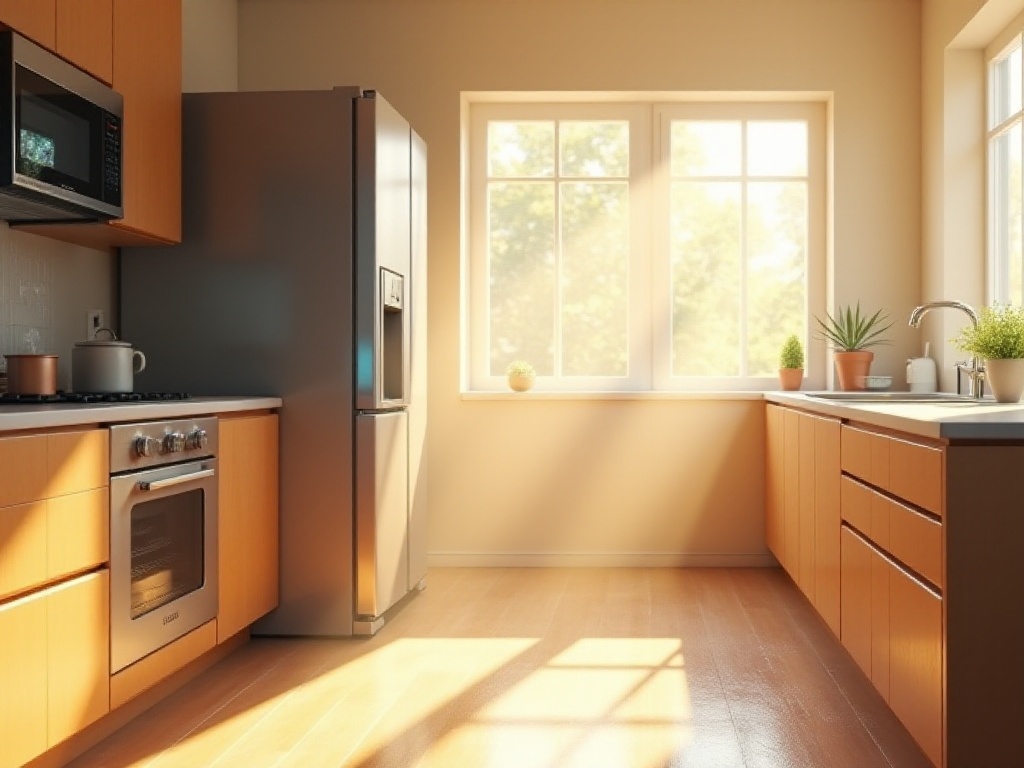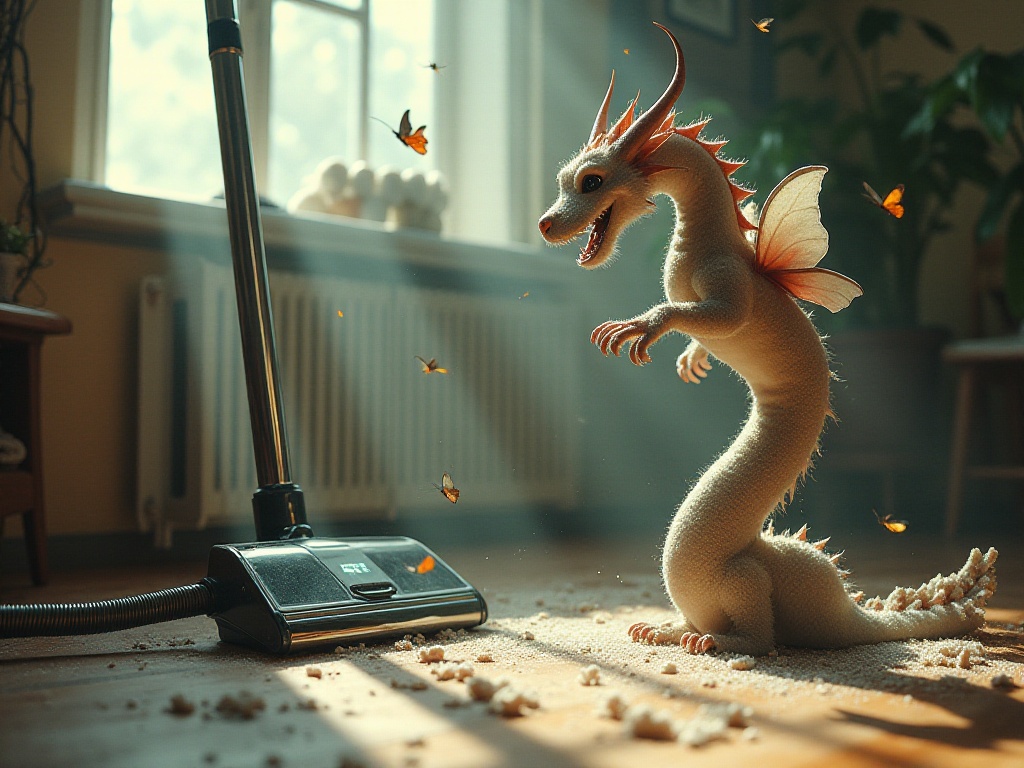Opening Words
Hello everyone! As a young person who has just entered society, I'm also starting to face the headache of home maintenance. To be honest, I was quite anxious at first, worried that if something wasn't handled properly, it would lead to major problems. However, after a few years of exploration, I've found myself becoming more relaxed about it.
I used to think that a house was like a precious artifact that needed careful attention, but now I realize houses are much more resilient than we imagine. Once you master the right methods and rhythm, maintaining a house can become really easy. Today I'd like to share my experiences with home maintenance as a post-95 generation person, hoping to provide some inspiration for young people who are similarly troubled.
Core Philosophy
When it comes to home maintenance, many young people probably have the same first reaction as I did: "Oh no, what a hassle!" Indeed, when you see those home maintenance checklists with dozens of items, it's easy to feel discouraged. But after several years of practice, I've developed a super practical "three-step" strategy: regular inspection, timely handling, and moderate innovation.
Regular inspection is like giving your house a health check, timely handling means solving problems as soon as they're discovered, and moderate innovation means using some clever tricks to make maintenance easier. These three steps might seem simple, but once you stick to them, you'll find that home maintenance isn't difficult at all.
For example, I've made a simple inspection plan for myself: checking if doors and windows are properly closed when I return home from work each day, spending half an hour checking the basic condition of each room every weekend, and doing a relatively detailed inspection one weekend each month. This layered inspection approach neither makes me too tired nor misses problems.

Monthly Inspection Checklist
For monthly house inspections, I suggest you remember just a few things. First is checking safety equipment, which is really important. Did you know? According to fire department statistics, 90% of household fires are related to smoke detector failure. So pressing the test button on your smoke detector each month is really buying peace of mind for yourself.
Let me share a small incident: just last year, my upstairs neighbor almost had a fire due to an electrical short circuit, but thanks to a properly functioning smoke detector that alarmed in time, a disaster was avoided. Since then, I've put checking the smoke detector at the top of my monthly inspection list.
Second is infrastructure inspection. The most important thing here is the water heater temperature setting. Many people might not know that the ideal temperature for a water heater is 60 degrees Celsius, which can both kill bacteria and prevent scalding. I previously wasn't aware of this and set the water heater temperature too high, once almost burning myself while showering - it still scares me thinking about it.
Besides these, I also check all faucets and pipe connections monthly. This isn't being overly cautious, because many leaks start from small drips. I've encountered this situation before - there was a slight water seepage at the pipe connection under the kitchen sink, and if I hadn't checked regularly, the cabinet bottom might have already gotten moldy by the time I discovered it.
Cleaning the air conditioner filter is also a monthly must-do. This is really important, especially for young people like us who frequently use air conditioning. Clean filters not only make the air conditioner more energy-efficient but also keep indoor air fresher. I've now developed a habit of cleaning the filter on the 15th of each month - it's easy to remember and hard to forget.
Door and window inspection is also an important part of monthly checks. Mainly looking at whether the door and window seals have come off and if there are any stuck spots in the tracks. These small problems can usually be solved at a very low cost if discovered and handled promptly. I once ignored a problem with the balcony door seal, which resulted in water leakage during rain and caused the floor to warp a bit.
Then there's the electrical appliance inspection. Every month I take time to check all the outlets in the house for signs of heating or blackening. I also check the power cords of various appliances to ensure there's no damage. This is really important because many electrical fires start from damaged power cords.

Seasonal Transitions
Speaking of seasonal transitions, this is a major part of home maintenance. Spring and autumn are absolutely the best times for deep cleaning because the temperature is moderate and cleaning isn't too tiring.
Many people only think about cleaning drainage gutters when it rains heavily, which is really not advisable. Let me share a trick I've figured out: before cleaning the drainage gutters, first use a garden sprayer to spray water on them and see where the water accumulates - this helps you accurately find blockage points. This is much more efficient than cleaning blindly.
In spring, I pay special attention to checking the house's waterproofing. After winter, many waterproof layers might crack. My approach is to take advantage of good weather to carefully check places prone to water seepage like the roof, balcony, and around windows. If problems are found, deal with them quickly before the weather gets hot.
Before summer arrives, air conditioner maintenance is crucial. Besides routine filter cleaning, I also check if there are any odd smells from the air outlet and if the cooling effect is normal. If cooling effectiveness is poor, it's best to get it checked before peak air conditioning season - this saves money and doesn't interfere with use.
Autumn is the best time to check the heating system. I start preparing about a month in advance, first checking if there are any leaks in the radiators, then trying to release the air. If problems are found, get property management or maintenance personnel to handle it before the heating season starts.
Before winter comes, door and window maintenance is particularly important. I check all door and window seals and replace them with new ones if necessary. I also add lubricant to door and window tracks so they won't stick in winter.

Innovative Tips
Speaking of innovative maintenance methods, I recently discovered an interesting technique - the tennis ball mop method. This is really my special trick. It involves fixing an old tennis ball to the end of a mop, specifically for dealing with floor scratches. I saw this method on a video platform and was quite skeptical at first, but after trying it, I found it works really well.
This method is especially magical for hardwood floors. The fuzzy texture of the tennis ball is particularly suitable for dealing with light scratches, and it doesn't leave unsightly marks like some floor waxes on the market. Now whenever I see small scratches on the floor, I use this method to treat them, and the results are surprisingly good.
Another really practical trick I think is using dryer sheets to prevent baseboard dust accumulation. I've been using this method for over half a year now, and the results are really amazing. Dryer sheets not only prevent static electricity but also emit a light fragrance, making the house feel fresher.
I've also developed a method for dealing with small wall scratches. Using matching nail polish to repair them works surprisingly well. Of course, this method requires choosing suitable nail polish based on the wall color, and you should test it in an inconspicuous area first.
For bathroom tile grout, I've found that using a baking soda paste is particularly effective for cleaning. Just mix baking soda with water to make a paste, apply it to the grout lines, wait 15 minutes, then gently brush with a toothbrush - the effect is better than many commercial cleaners.
Range hood cleaning has always been a challenge until I discovered this method: before washing, first soak in hot water with dish soap for 15 minutes, then gently scrub with a cleaning brush - the grease comes off easily. This method not only saves effort but also doesn't damage the range hood components.

Professional Support
Although we can handle many maintenance tasks ourselves, some things still require professionals. For example, HVAC system inspection is really not something you should mess with yourself. I recommend having professionals check it twice a year, in spring and fall. According to energy department data, regularly maintained HVAC systems are 15-20% more energy efficient than unmaintained ones.
I once tried to save money by cleaning the indoor air conditioning unit myself, but not only did I fail to clean it properly, I also broke a part. In the end, I had to call a professional technician to fix it, spending more than regular maintenance would have cost. Since then, I've understood: when you need professional help, don't try to force it yourself.
Electrical system inspection must also be done by professionals. Especially if you notice your appliances frequently tripping the circuit breaker or certain outlets getting hot, you really can't try to figure it out yourself. I have a friend who almost caused an electrical accident by trying to repair an outlet themselves.
Annual plumbing inspection is also important. Although we can handle small daily problems ourselves, inspection of the entire piping system should be done by professionals. They have specialized equipment to detect leaks or blockages in pipes that we can't see with the naked eye.

Handling Emergencies
Don't panic when facing emergencies. For example, with pipe blockages, which I've encountered many times, I've now developed an emergency plan: first try pouring boiling water, if that doesn't work, use baking soda with vinegar, and only consider chemical drain cleaners as a last resort. From my observation, 80% of minor blockages can be solved using the first two methods.
Let me share a real experience. Once in the middle of the night, my sink suddenly got blocked and water kept overflowing. I was really panicked at the time and almost called for repairs. But when I calmed down and thought about it, I first tried the hot water flushing method, and surprisingly it solved the problem. This incident made me realize that many seemingly serious problems can actually be solved with simple methods.
Water leaks are also common emergencies. If you discover a pipe leak, the first thing is to shut off the main valve, then use towels or basins to catch the leaking water. Don't panic at this time - first take some photos to document the situation, then call for repairs. This not only prevents the leak from causing more damage but also helps repair personnel find the problem more quickly.
Then there's when electrical appliances suddenly stop working - first check if the circuit breaker has tripped. If it has, don't repeatedly reset it as this might lead to more serious problems. My suggestion is to first disconnect all appliances, then reset the breaker, and check which appliance is causing the problem one by one.
Door lock problems are also annoying. I suggest keeping a spare key with a trusted neighbor or friend. If the lock really has problems, at least you have a backup plan. Also, it's recommended to save the phone number of a reliable locksmith company to avoid panicking when problems occur.
Final Words
After these years of exploration, I've truly come to understand: home maintenance isn't as scary as imagined. The key is to establish your own maintenance system, combined with some innovative tricks, to keep your house in optimal condition.
The most important thing is to have patience and not expect to solve all problems at once. My current approach is to record problems as I find them, then handle them based on priority. This not only prevents exhaustion but also ensures important issues are addressed promptly.
Actually, home maintenance is like managing a long-term relationship - it needs attention but shouldn't be too tense. Finding the right rhythm and method for yourself is what makes this process easy and enjoyable.
By the way, do you have any unique home maintenance tricks? Welcome to share them in the comments section. Maybe your experience can help other troubled friends. I'll also continue to interact with everyone in the comments section, sharing more new discoveries from my home maintenance process.




